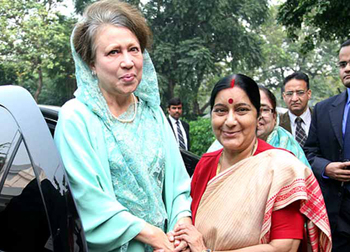 Dhaka, Jun 27: External Affairs Minister Sushma Swaraj today held a meeting here with former Bangladesh Prime Minister and chairperson of Bangladesh Nationalist Party (BNP) Khaleda Zia.
Dhaka, Jun 27: External Affairs Minister Sushma Swaraj today held a meeting here with former Bangladesh Prime Minister and chairperson of Bangladesh Nationalist Party (BNP) Khaleda Zia.
Swaraj, who held a series of meetings with the top leadership here yesterday including Prime Minister Sheikh Hasina besides holding delegation-level talks with her Bangladeshi counterpart A H Mahmud Ali, held talks for nearly half-an-hour with Zia at her hotel.
The meeting was termed as a "courtesy meeting" by Indian officials.
The external affairs minister's meeting with Zia comes in the backdrop of the Indian government's efforts to reach out to all sections of Bangladesh society.
Interestingly, the BNP chairperson did not meet President Pranab Mukherjee during his first official foreign visit here after assuming office last year.
Zia's party had cited security reasons for her calling off the meeting with Mukherjee in view of a two-day general strike called by BNP's ally Jamaat-e-Islami to press for a halt to the trial of fundamentalist leaders for war crimes during Bangladesh's liberation war in 1971.






Comments
Add new comment